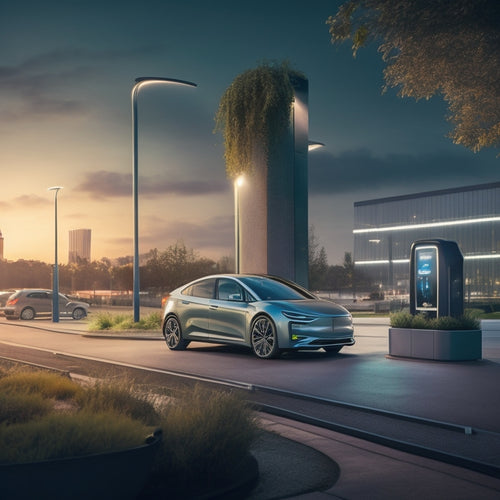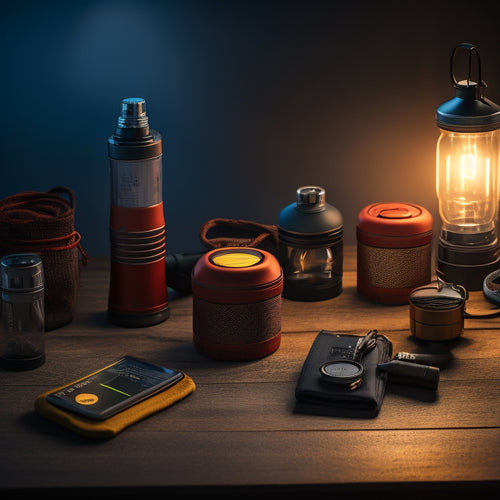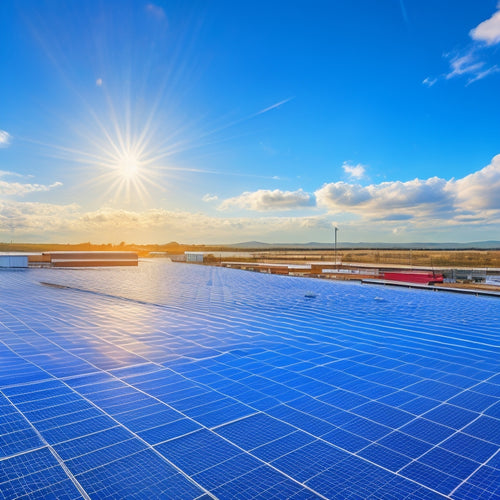
Common Camper Electrical System Issues
Share
When you encounter common camper electrical system issues, you'll likely deal with battery failures, loose connections, or circuit overloads. Regularly check battery fluid levels and clean terminals to prevent unexpected problems. Inspect connections for corrosion, and verify they're tight to avoid power loss. Circuit breakers are essential; confirm they're properly rated to protect against electrical overloads. Pay attention to your power requirements by evaluating the wattage of your appliances to prevent overuse. For a more thorough understanding of these challenges and solutions, you might investigate additional perspectives that can enhance your camping experience.
At a Glance
- Loose or corroded connections can lead to power loss, necessitating regular inspections to ensure tight and clean terminals.
- Circuit breaker malfunctions may occur due to incorrect ratings, causing nuisance tripping or failure to trip during overloads.
- Inadequate power assessments can result in overloading circuits; always calculate total energy needs and prioritize efficient appliances.
- Battery maintenance issues, such as low fluid levels or insufficient charge monitoring, can significantly shorten lifespan and performance.
- Wiring damage from wear or corrosion can create shorts or fire hazards; routine checks are essential for safety and functionality.
Reliable Power for Adventures
To guarantee you have reliable power during your escapades, proper battery maintenance is vital. Regularly checking fluid levels and keeping terminals clean can prevent unexpected failures.
Additionally, maintaining the depth of discharge (DOD) helps prolong battery life and enhances overall performance, which is critical for off-grid energy independence.
Integrating solar power into your system can provide a sustainable energy source, extending your off-grid capabilities, and ultimately contributing to a lower carbon footprint through renewable power solutions.
Battery Maintenance Tips
While many campers focus on the fun aspects of their excursions, neglecting battery maintenance can lead to unexpected power failures. To keep your journeys powered, it's essential to understand the different battery types used in campers—typically lead-acid, AGM, and lithium. Each type has specific maintenance needs.
For lead-acid batteries, check the water levels regularly and top them off with distilled water. Clean the terminals to prevent corrosion, and verify they're tightly connected.
AGM batteries require less frequent maintenance but should still be inspected for any signs of damage or leakage.
Lithium batteries are low-maintenance but monitoring their charge levels is key to prolong their life.
Establish a maintenance frequency based on your usage. If you camp frequently, consider checking your batteries at least once a month.
Before long trips, test their voltage to confirm they're fully charged. Additionally, avoid letting your batteries discharge completely, as this can shorten their lifespan.
Solar Power Advantages
When planning your next camping excursion, utilizing solar power can greatly enhance your experience by providing a reliable, renewable energy source.
With the right setup, you can capture the sun's energy to power your devices and appliances, giving you the freedom to investigate without worrying about running out of battery.
There are several solar panel types to evaluate, including monocrystalline, polycrystalline, and thin-film.
Monocrystalline panels are the most efficient and space-saving, while polycrystalline panels are often more affordable.
Thin-film panels offer flexibility and lightweight options, perfect for smaller setups.
For successful installation, start by determining your power needs and the space available on your camper.
Choose a mounting location that maximizes sun exposure, ideally at an angle that aligns with your latitude for peak performance.
Verify the wiring is secure and protected from the elements.
It's also wise to invest in a charge controller to prevent battery overcharging.
Enhanced Safety for Campers
To guarantee enhanced safety in your camper, it's vital to use proper wiring techniques that prevent short circuits and overloads.
Incorporating a battery backup system can provide reliable power during unexpected outages, making certain that essential devices remain operational.
Installing circuit breakers is equally important, as they protect your electrical system by interrupting power flow during faults.
Proper Wiring Techniques
How can you guarantee the electrical system in your camper is both efficient and safe? Start by using proper wiring techniques.
Create detailed wiring diagrams to map out your camper's electrical system. This visual guide will help prevent errors and make certain you connect everything correctly.
Next, pay attention to wire gauges. Selecting the right wire gauge for your camper's electrical load is vital. Thicker wires (lower gauge numbers) can handle higher currents without overheating, while thinner wires (higher gauge numbers) are suitable for lighter loads.
Always refer to the manufacturer's specifications for guidance on the appropriate gauge for each circuit.
When making connections, use high-quality connectors and secure them properly to avoid arcing or corrosion.
Insulate exposed wires with heat shrink tubing or electrical tape to protect against moisture and wear.
Circuit Breaker Importance
Proper wiring techniques play a significant role in the overall safety of your camper's electrical system, but incorporating circuit breakers enhances that safety even further.
Circuit breakers act as the first line of defense against electrical overloads and short circuits, preventing potential fire hazards and equipment damage.
When selecting circuit breaker types, you'll find options such as thermal, magnetic, and combination breakers. Each type serves a specific purpose and is essential for protecting various circuits within your camper.
For instance, thermal breakers respond to heat generated by excessive current, while magnetic breakers trip instantly during short circuits.
Understanding circuit breaker ratings is equally important. These ratings determine how much current a breaker can handle before it trips.
Choosing the appropriate rating guarantees that your camper's electrical systems are safeguarded against surges and overloads. A breaker rated too high may not trip in time, while one rated too low can lead to nuisance tripping.
Incorporating the right circuit breakers into your camper's electrical system not only enhances safety but also provides peace of mind, allowing you to enjoy your excursions without worry.
Key Components Overview
Understanding the key components of your camper's electrical system is essential for reliable operation. You need to know the different types of power sources available, such as batteries and shore power, along with their specific wiring and connection requirements.
Additionally, considering high-efficiency solar solutions can greatly enhance your off-grid camping experience. This knowledge will help you troubleshoot issues and guarantee a safe, efficient electrical setup.
Power Source Types
When you're setting up your camper's electrical system, it's crucial to know the different types of power sources available. Your freedom on the road hinges on these energy types. The most common power sources for campers include batteries, shore power, and generators.
Batteries are usually the primary energy source, providing 12V DC power for lights, appliances, and other systems. Deep-cycle lead-acid or lithium-ion batteries are popular choices, offering reliable energy and the ability to recharge while you drive or via solar panels.
Shore power is another key option, allowing you to connect to external electrical systems at campgrounds or RV parks. This typically provides 30A or 50A service, supplying 120V AC power to run larger appliances and systems.
Lastly, generators serve as a versatile power source when you're off the grid. They can produce both 120V AC power and 12V DC power, depending on the model.
Understanding these power sources and energy types will guarantee your camper's electrical system operates efficiently, giving you the freedom to investigate without limits.
Wiring and Connections
A camper's electrical system relies heavily on the integrity of its wiring and connections, which serve as the backbone for power distribution. If you're looking to maintain your freedom on the road, understanding this aspect is essential.
Start by reviewing your wiring diagrams, which provide a roadmap of your electrical layout. These diagrams help you identify the various circuits and their components, guaranteeing you know where potential issues may arise.
Connection troubleshooting is another important skill. Loose or corroded connections can lead to power loss or short circuits. Regularly inspect all connections, especially at junctions and terminal blocks, and verify they're tight and clean. Use dielectric grease to protect against moisture and corrosion.
When issues arise, don't overlook the significance of proper gauge wiring. Using wires that are too thin for the load can create heat and lead to failure. Additionally, keep an eye on any fraying or damage, as these can lead to shorts or fires.
Selecting Based on Power Needs
To choose the right electrical system for your camper, you need to assess your power requirements first. This involves calculating the energy consumption of all appliances and devices you'll be using, ensuring you account for peak and continuous loads.
A well-designed solar system can greatly enhance your camper's energy efficiency, allowing you to utilize renewable energy for home appliance freedom.
Assessing Power Requirements
Understanding your camper's power requirements is essential for ensuring a reliable electrical system. Start with a thorough power assessment to identify the devices and appliances you'll use. This includes lights, refrigerators, air conditioners, and any other electronics. Each device has a specific wattage, so make a list of all the appliances and their power ratings.
Next, calculate your total energy needs. Add up the wattage of all devices you plan to run simultaneously. This total will guide your decisions when selecting batteries, solar panels, or a generator. Remember, overestimating your needs can lead to inefficient energy use and wasted resources, while underestimating can leave you without power when you need it most.
Focus on energy efficiency to maximize your system's performance. Consider LED lighting, energy-efficient appliances, and smart power strips to minimize consumption.
Understanding Energy Consumption
When it comes to selecting energy sources for your camper, knowing how much power each appliance consumes is crucial for effective energy management. Start by checking the wattage ratings of your devices, which are often found on labels or in manuals. This information helps you calculate overall energy needs and guarantees you're not overloading your system.
Next, prioritize energy efficiency. Consider appliances designed for low power consumption, as they can greatly extend your battery life without sacrificing comfort. For example, LED lighting and energy-efficient refrigerators can reduce your overall demand, allowing you to enjoy longer trips off-grid.
It's also important to implement a power management strategy. Track your energy use daily to identify patterns and adjust your habits accordingly. If you plan to run multiple appliances simultaneously, verify your power source can handle the load without risk of failure.
Lastly, invest in a quality battery monitor. This tool provides real-time data on your energy consumption, helps prevent over-discharging, and aids in optimizing your energy use.
Higher Efficiency Than Generators
When comparing camper electrical systems to traditional generators, consider the cost-effectiveness of your energy source.
By utilizing advanced battery technologies and solar panels, you'll find that these systems often provide more usable power for less money over time.
This efficiency not only reduces your fuel costs but also minimizes maintenance expenses associated with generators.
Cost-Effectiveness Comparison
A camper's electrical system can offer considerable cost advantages over traditional generators, especially when evaluating long-term efficiency. While generators may seem cheaper upfront, they often require ongoing fuel purchases, maintenance, and repairs that can add up quickly.
In contrast, investing in battery upgrade options can provide you with a reliable power source that's both sustainable and cost-effective.
By choosing the right inverter types, you can further enhance your system's efficiency. An inverter converts DC power from your batteries into AC power, which is necessary for many appliances.
With options ranging from pure sine wave to modified sine wave inverters, selecting the right type depends on your power needs and budget.
Additionally, battery technology has improved greatly, with lithium-ion batteries offering higher energy density and longer lifespans compared to traditional lead-acid batteries. This means fewer replacements and lower overall costs.
When you calculate your expenses over time, a well-designed camper electrical system not only provides freedom and flexibility on the road, but it also proves to be a more economical choice than relying on generators.
Embracing this technology allows you to enjoy your excursions without the constant worry of fuel costs and maintenance.
Frequently Asked Questions
How Can I Troubleshoot Flickering Lights in My Camper?
To troubleshoot flickering bulbs, check the connections at the fixture and the circuit. Verify the wiring's secure and inspect for frayed wires. Dimming lights might indicate insufficient power; consider checking your battery or converter's output.
What Should I Do if My Camper's Battery Isn't Charging?
If your camper's battery isn't charging, check connections for corrosion, guarantee proper battery maintenance, and investigate charging solutions like solar panels or portable chargers. Regular checks can prevent issues and keep your excursions uninterrupted.
How Can I Prevent Electrical Overload in My Camper?
To prevent electrical overload in your camper, think of circuit protection as a fortress guarding against chaos. Implement load management techniques, like distributing power evenly, to guarantee your escapades remain uninterrupted and electrifyingly smooth.
What Are Signs of a Failing Camper Inverter?
You'll notice signs of inverter failure when you experience power fluctuations, strange noises, or an inability to power devices. Regularly check connections and monitor performance to guarantee your camper's electrical system remains reliable and efficient.
How Often Should I Inspect My Camper's Electrical System?
You should inspect your camper's electrical system every six months. Regular electrical maintenance keeps your system running smoothly and prepares you for any upgrades. Staying proactive guarantees your excursions remain hassle-free and enjoyable.
Explore More
As you initiate your next expedition, remember that understanding your camper's electrical system can prevent frustrating surprises. Coincidentally, many campers face similar issues, so you're not alone in this trek. By recognizing key components and their power needs, you can enhance both reliability and safety. With a little preparation, you'll find that a well-maintained system is often more efficient than a generator, allowing you to fully enjoy the great outdoors without worry. Happy camping!
Related Posts
-

Solid State Batteries in Electric Vehicles
Solid-state batteries revolutionize electric vehicles by offering a longer lifespan and higher energy density than tr...
-

Best Solar Powered Flashlights for Emergency Situations
When you're choosing the best solar-powered flashlights for emergency situations, focus on their brightness, battery ...
-

Commercial Solar Energy
As you consider powering your business with commercial solar energy, you'll uncover it offers a triple benefit: signi...


